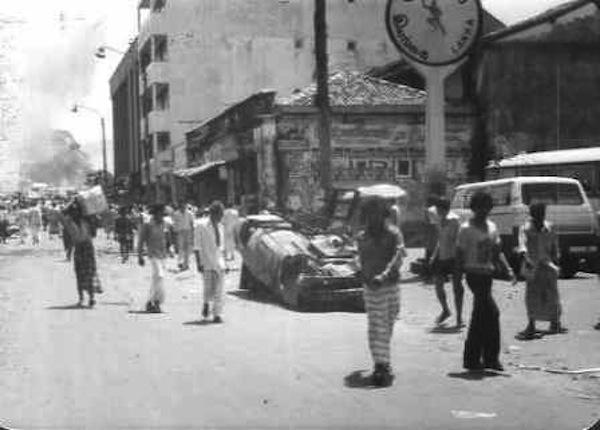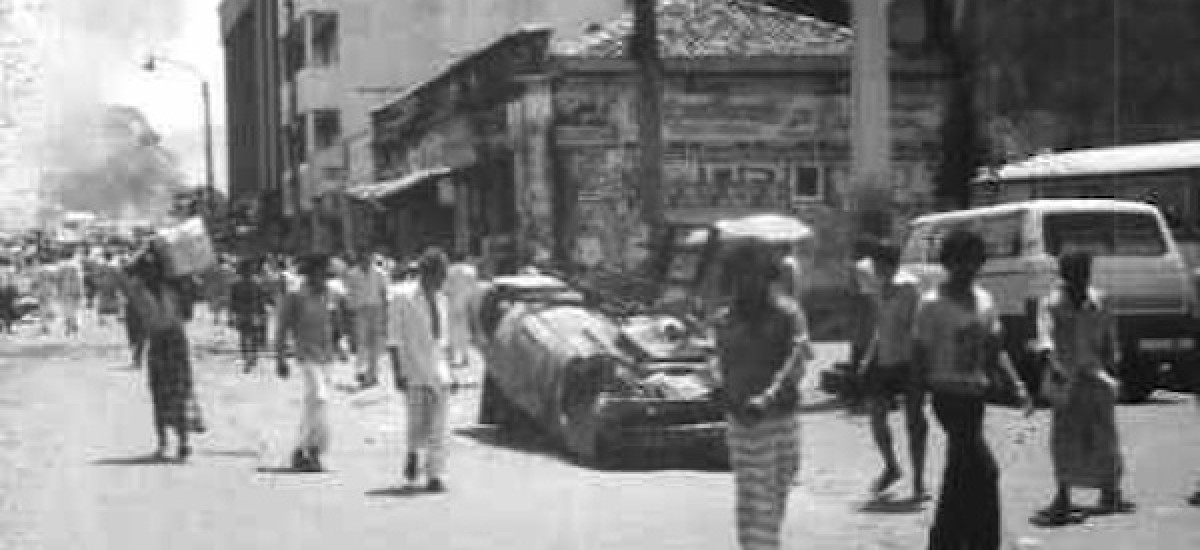
Photo via blackjuly.info
Fault-lines
Perhaps it is a tragic coincidence of our time; or maybe it was inevitable given the passage of generations, that we are marking the thirty year anniversary of Black July at the same time as we are approaching a centenary since the communal riots of 1915. With the escalation of religious intolerance and communal tension in recent months almost resembling the events of exactly century ago, we are faced with a peculiar question: what shall we commemorate? As much as the commemoration of our history is about preserving those memories for future generations to learn from and for its darker chapters never to be repeated, it must also compel us to be vigilant and pay attention to the history that is in making today. Are we an inherently violent people who are incapable of peace?
Of course we are not an inherently violent – but despite the significant influence of Buddhism on our civilisation, there is no evidence that we are inherently peaceful either. That is to say that ours is not unique among the ancient civilisations of the world and that we too adapt to our times and react to our environment like any other. Before European colonisation, our society was organised hierarchically along social classes and castes. It was inevitable that the ancient civilisations of the East and the enterprising West of the renaissance years were eventually going to come into direct contact with each other. When that did happen on our shores, it was inevitable that our ancient social order which organised society in a stable – but broadly oppressive – caste based social structure would face direct competition from an alternative model for social organisation based on the egalitarian aspirations that the reformation has unleashed in Europe.
The late 19th century saw the emergence of an educated class of Sri Lankans who symbolised avenues for upward social mobility that had never before existed in the island. The colonial government and missionary movements were expanding opportunities for the locals to gain an education which would qualify them to serve the crown. The Ceylon Civil Service and other professions saw an influx of a new band of local elites. The avenues for social mobility would no longer be restricted to those with a birth-right. The number of unofficial local members in the Ceylon Legislative Council was expanded in 1889 to accommodate the growing appetite of locals for representative governance and ideas of social mobility that had penetrated the public conscience – if not the political discourse in our country for the first time. But local representatives to the legislative council were being chosen based on their ethnic and religious identity and the currents of democracy, as they flowed through the land, would divide the people along communal divisions. Those would eventually become the fault lines of a century of perpetual conflict.
But neither the colonial government nor the new local intelligentsia would challenge – let alone dismantle or undermine – the hierarchical social order of the old world. Instead, they would assume an elitist entitlement to their status in society and proximity to the power centres of government. The democracy we eventually inherited would tempt them to carve out the land along communal lines on which the unofficial representatives to the Legislative Council had been chosen by their colonial masters. The old order that stratified our society by notions of caste and class superiority, and the new order that fenced out each community, have since coexisted for well over a century. The democratic socialist republic we live in today has been shaped by competing political divisions that have clashed for power along each of those historical fault lines. That is why even today, our political parties must balance communal interests and class or caste interests in the constituency; both to assume power and then to govern.
Education in colonial Ceylon; was designed to produce an efficient bureaucracy and disciplined professionals. It was not designed to produce leaders who could inspire the masses which may challenge the empire. The products of most elite missionary schools were accused of being ‘brown sahibs’ who thought and spoke like their imperil masters and far removed from their own countrymen and women who constituted the masses. Such accusations were not unfounded; nor were they broadly unfair. Students who spoke in a native tongue was often punished for it – and such punishment was accepted by parents who was adamant that their children must learn English – if they couldn’t wholly shed their own identity and learn to be English. This philosophy was not without its detractors and peculiarly enough, its dissenters were mostly found among the foreign educators. A. G. Fraser who became Principal of Trinity College, Kandy at the turn of the twentieth century was one of those few dissenting voices. Early into his tenure at Trinity, he wrote that:
“A thorough knowledge of the mother tongue is indispensable to the culture of real thinking power. More, a college fails if it is not producing true citizens; and men who are isolated from the masses of their own people by ignorance of their language and thought can never fulfil the part of educated citizens or be true leaders of their race”
~ Fraser of Trinity and Achimota by W. E. F Ward, Ghana University Press, 1965 (p 49)
Fraser’s views were radical then, and they remain at the fringes even today; even in the schools they built as among the aspiring middle class parents who compete to send their children to the same missionary established institutions. An ‘English education’ in an elite school still offer the surest – if not the only – avenue to the middle class of Sri Lanka. As Fraser feared half a century before Sri Lanka gained her independence; very few of the English speaking, cosmopolitan elite that inherited political power in the newly independent country were able to understand – let alone empathise with – the masses that they ruled. They represented, and rose to power, on the back of a powerful middle class that dominated industry, land and enterprise. But starting with the land reforms of the mid 1950s, the tables would turn. Details of the subsequent social transformation may be analysed elsewhere, but today the English speaking middle class is too weak and not found in sufficient geographic concentration outside Colombo to be politically relevant. Vestiges of their traditions and memories of a glorious past notwithstanding, the leaders they vote for do not get elected and the thoughts and ideas they express – mostly in English – rarely penetrates the public discourse: and the irony of that realisation is not lost on me, and should not be lot on the readers of Groundviews either.
The tragedy of the middle class elite in Sri Lanka is not that they are politically or socially irrelevant. On the contrary, middle class Sri Lankans of all communities define themselves not on their communal identity but rather by the stared liberal values and progressive political outlook. The small and shrinking numbers of Tamils, Sinhalese, Muslims and Burghers of middle Sri Lanka who listen to the same kind of music, watch the same movies, read similar books and discuss very similar topics have more in common with each other than with rural cousins from their own ethnic or religious communities. Yet they have never understood the communal tensions and class struggles of the masses that have torn the social fabric of our country for over a century – for the very reasons that Fraser had warned us about a century earlier.

